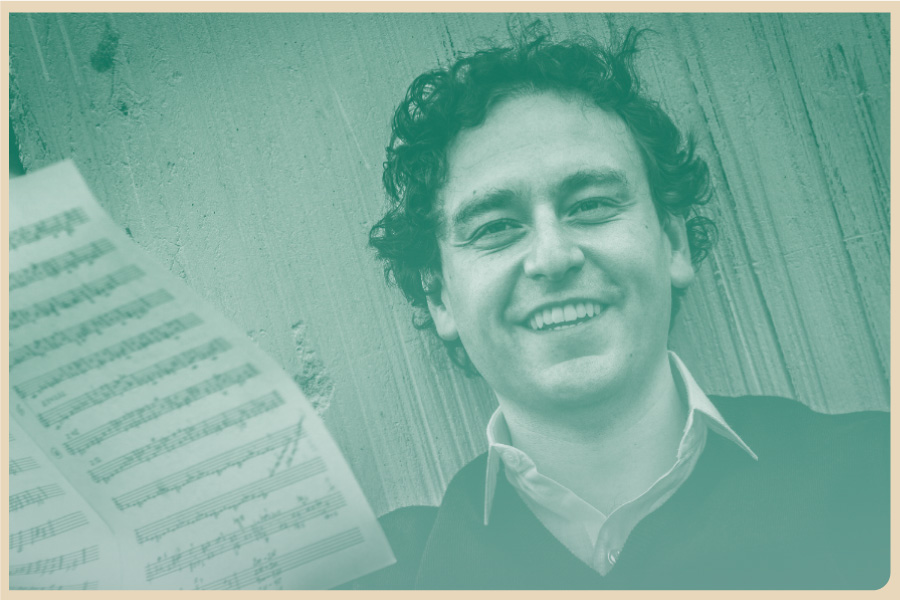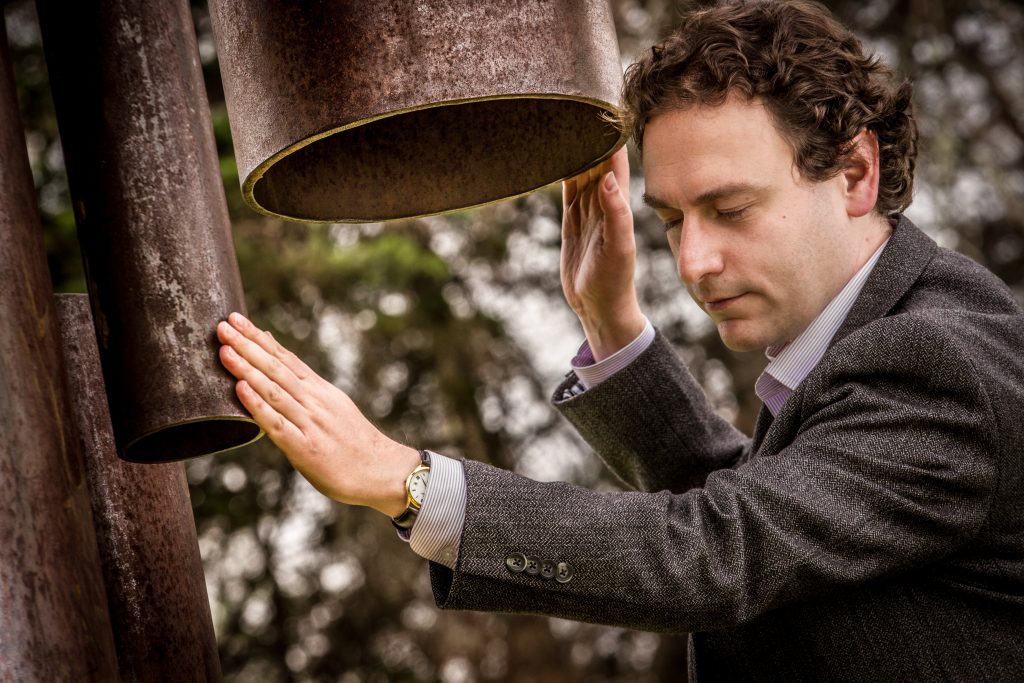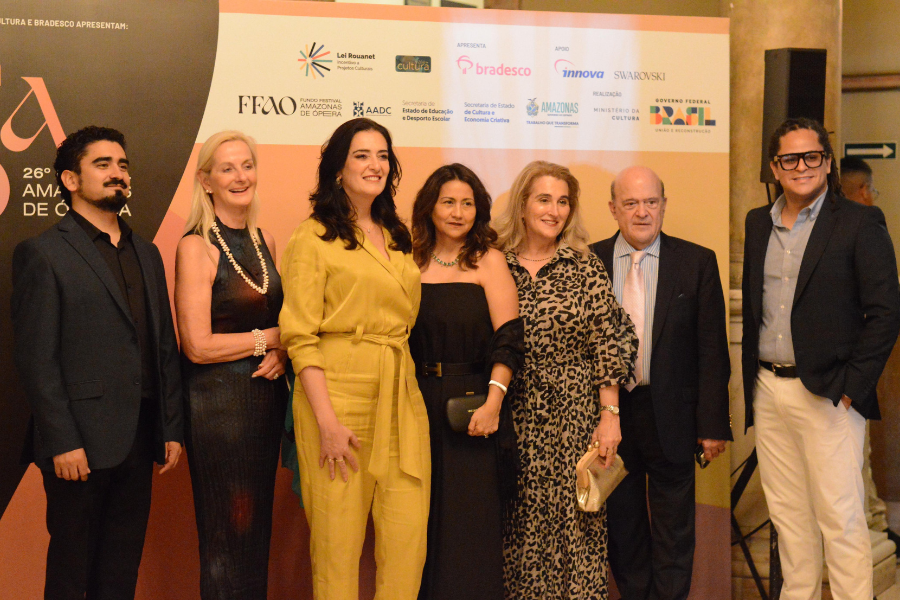Pedro Sarmiento, compositor: «Desde la composición busco dar voz y transformar realidades, romper con la indiferencia y los prejuicios»

El joven compositor colombiano busca reivindicar tanto la belleza de las partituras como el compromiso social y político a través de su música. Sus obras han sido presentadas en distintos países de América Latina y también en Estados Unidos, España, Alemania y Francia. Hoy, este artista independiente desarrolla su ingenio musical con los principales solistas, conjuntos de cámara y orquestas de Colombia. Para Sarmiento, «El arte debe romper su propia indiferencia, debe hacer suyo la voz no escuchada y sobre todo trabajar con y en la esperanza».
Su música es compleja y envolvente. La obra Razones discretas, escrita para dos flautas, vibráfono y xilófono, rompe esquemas y nos sitúa en un espacio sonoro estimulante, obsesivo. Otra pieza: Sarta para marimba. El alma de referentes como Steve Reich se hace presente. Repetitiva y minimalista, la composición nos seduce con su sencilla belleza.
El autor de estas obras musicales es el colombiano Pedro Sarmiento. Nació en Cali, capital del Valle del Cauca, en 1977. Su relación con la música comenzó tempranamente, en 1985, cuando ingresó al Conservatorio de Música de la Universidad Nacional de Colombia. Poco a poco, fue construyendo su carrera artística con estudios en guitarra clásica junto a maestros como Sonia Díaz, Ramiro Isaza e Irene Gómez.
La participación de Sarmiento en conjuntos como el Cuarteto de Guitarras Prisma y presentaciones junto a la Orquesta Sinfónica del Conservatorio de la Universidad Nacional, entre otras experiencias, le sirvieron para hoy llegar a ser un destacado compositor contemporáneo. No obstante, fue un proceso no exento de dificultades. La crisis económica y de violencia en Colombia durante la década de 1990 complicaron el panorama social del país. No obstante, para Pedro, un estudiante de composición en ese tiempo, la idea era fija: «La cultura se hizo frente de resistencia ante la situación», explica.
En esta entrevista exclusiva, Pedro Sarmiento nos relata sus primeros recuerdos con la música, las impresiones que tiene con respecto a la factura y significado de las artes y la cultura en Colombia y nos plantea diferentes aristas sociales y políticas para vislumbrar un futuro mejor a través de la música. «No he querido aislarme de las realidades que viven otras personas en mi país, de hecho, busco entenderlas, analizarlas, ser cercano a esto porque pienso que puedo desde la composición dar voz y transformar estas realidades, romper con la indiferencia y los prejuicios que incluso, yo mismo puedo tener», adelanta.
Una riqueza cultural a través de la composición
- ¿Cuál es tu primer recuerdo con la música? ¿Cómo te acercaste a ella? ¿Hubo alguna persona en especial que te mostró este mundo? ¿Recuerdas la primera vez que fuiste a un teatro?
Recuerdo que mi mamá nos llevó a mis hermanos y a mi a un concierto gratuito que ofreció la Orquesta Sinfónica de Venezuela en el Auditorio León de Greiff en Bogotá. Para nosotros fue la primera vez que entramos a un auditorio y que vimos a una orquesta sinfónica, desde ese momento tuvimos una conexión muy fuerte al punto de que los tres nos graduamos como músicos en diferentes disciplinas. A mí me sorprendió ver a tantas personas juntas tocando y me entusiasmé mucho por el violín, que fue el instrumento con el que empecé a estudiar música a los seis años.
- ¿Cómo ha influido tu cultura en la realización de tu trabajo? ¿Crees que el origen de una persona influye en las formas de hacer arte?
Creo que es muy difícil poder desarraigarte totalmente de la cultura de la que vienes. Colombia es un país asimétrico socialmente y en mi caso sé que soy un compositor que proviene de la clase media emigrante del campo y de que por mi formación de conservatorio adopté una serie de patrones y valores culturales europeos vistos como elitistas. Sin embargo, no he querido aislarme de las realidades que viven otras personas en mi país, de hecho, busco entenderlas, analizarlas, ser cercano a esto porque pienso que puedo desde la composición dar voz y transformar estas realidades, romper con la indiferencia y los prejuicios que incluso, yo mismo puedo tener.
En mi país ha sobrevivido la idea de que el nacionalismo es el único medio de validación de la cultura colombiana, lo que alimentó un constante sentimiento de pérdida en favor de agendas e ideologías políticas, algo que le ha hecho mucho daño al medio musical; de hecho, en estos últimos años mi trabajo se ha enfocado en evidenciar la manipulación que se ha hecho con esta idea errónea sobre la cultura en un país particularmente paternalista en este sentido. Con cada persona que muere a diario en mi país se pierde también, de forma irremediable, una visión única de ver el mundo, con ella muere también toda nuestra riqueza cultural; en eso hay que hacer mucho énfasis.
- ¿Cómo fue tu debut profesional en la escena musical? ¿Qué obra o pieza se interpretó? ¿Puedes describirme lo que recuerdes de ese momento?
Bueno, yo resalto tanto mi debut nacional como mi primer concierto internacional. El primero fue con el estreno del Concierto para guitarra y orquesta que se estrenó en el Festival Internacional de Música Contemporánea de Bogotá con la Orquesta Filarmónica de Cundinamarca. Por entonces yo era aún estudiante en el conservatorio y recuerdo que al estreno fueron mis padres y mi maestro de composición.
Unos años después se estrenó en Tatuí —una pequeña ciudad del Estado de São Paulo— mi Sinfonía para timbales y orquesta de vientos en el primer Encuentro Latinoamericano de Directores, Compositores y Arreglistas de Banda Sinfónica. Allí hice muy buenos amigos con quienes trabajé durante nueve años en Argentina, Brasil, España y Venezuela. Pienso que gracias a este concierto se me abrieron las puertas en el continente.
Música con compromiso
- ¿Qué recuerdos tienes de tus estudios de composición? Tuviste clases magistrales con reconocidos maestros como Luis Bacalov. ¿Qué experiencias rescatas de tu formación?
Los años noventa en Colombia estuvieron marcados por una fuerte recesión económica y un incremento sin precedentes en la violencia y por ambas razones, fueron pocas las oportunidades que se tuvieron para que vinieran grandes maestros al país. Sin embargo, gracias a personas como Cecilia Casas, Carmen Barbosa, Estela de Páramo, Irwin Hoffman y el guitarrista uruguayo Eduardo Fernández pudimos tener talleres con compositores como Luis Bacalov, Coriún Aharonian, Marlos Nobre, Tania León y Leo Brouwer.
La cultura se hizo frente de resistencia ante la situación y se crearon espacios importantes como el Festival de Guitarras Compensar, el Festival de compositores colombianos, el Festival Internacional de Música Contemporánea y Colón Electrónico; incluso nosotros como estudiantes de guitarra fundamos un festival universitario que se llamó Gritos de Madera que se hizo hasta el 2014.
Debido a que mi maestro, Blas Emilio Atehortúa, no podía venir a Bogotá sino cada quince días a dictarnos clase al conservatorio se organizó un taller en casa de la también compositora Amparo Ángel donde asistieron, además de los estudiantes del conservatorio, algunos estudiantes de otras universidades que hoy día son mis amigos y colegas del Círculo Colombiano de Música Contemporánea —CCMC. Entonces, creo que aquí hay una lección de aprovechar el mayor número de oportunidades que se te presenten porque en ellas siembras tu futuro.
- ¿Tienes algún proceso creativo o de preparación para componer? ¿Podrías describirlo?
En realidad mi proceso creativo cambia un poco dependiendo del tipo de obra que esté trabajando. Por ejemplo, cuando trabajo por comisión o encargo suelo reunirme un par de veces con la persona que la ha comisionado para saber qué lo motivó a hacer el encargo, saber lo que tiene en mente, la expectativa que tiene con la obra, el uso que quiere darle y si tiene alguna referencia del tipo de obra (estilo o sonoridad) que le gustaría tuviera la obra. Algo similar he hecho cuando trabajo con cantantes; puede ser que me reúna con el autor de los textos, con el cantante o con el director del coro para conocer de antemano las condiciones iniciales y con eso en mente empiezo a pensar en la obra como tal.
Hace poco escribí una obra para piano con base en una partitura gráfica que dibujé en una única sesión como si estuviera haciendo escritura automática. El proceso de composición consistió posteriormente en traducir este boceto en música teniendo que interpretar cada uno de los símbolos que hice, cada rasgo específico. Debo admitir que tanto el pianista como yo quedamos muy contentos con el resultado final porque la pieza conservó mucho de lo caprichoso del boceto original, característica que usó para hacer una interpretación muy teatral, como si él estuviera componiendo la obra en el escenario.
- ¿Tienes alguna composición propia que sea tu favorita? ¿Cuál y por qué?
Le tengo mucho cariño a varias de mis obras por lo que han representado en mi carrera. Por ejemplo, mis Canciones, Op. 15 se estrenaron en una versión que trabajé con la cantante Juanita Delgado a quien escogí por su experiencia en teatro musical y en canto lírico, pudiendo trabajarlas como si fueran un pequeño musical. También le tengo un aprecio muy especial a todo el ciclo de Sartas que son piezas unitarias para diferentes instrumentos solistas.
Y desde el punto de vista social, por así decirlo, le tengo mucho cariño a Trujillo una obra para orquesta que compuse con base en la masacre de Trujillo (Cauca – Colombia) y que fue muy bien recibida por el público. Al concierto de estreno asistieron personas que trabajan con víctimas de la violencia y me agradecieron personalmente que hubiera tratado con tanto respeto un tema tan complejo y difícil.
«Es importante empezar a trabajar con base en valores como la esperanza»
- ¿Qué rol puede o debe tener el arte en los momentos que vivimos actualmente?
El año pasado hablé de esto con varios amigos del medio y en el fondo creemos que es importante empezar a trabajar con base en valores como la esperanza. Nos dimos cuenta que las personas recurren a la música para volver a equilibrar sus emociones (fenómeno ya estudiado en musicoterapia) y son muchas las emociones negativas las que nos afectan. La pandemia acrecentó los procesos de duelo que vienen acompañados por sentimientos de soledad, culpa, ira, abandono e incertidumbre porque en muchos casos la persona que falleció era la cabeza del hogar.
La forma como se ha tratado la pandemia en países como Estados Unidos, México, Colombia, Chile o Brasil despertó sentimientos de inconformidad, aumentó el número de denuncias y reclamos a las autoridades y dejó al descubierto nuestras desigualdades y asimetrías sociales que continuamente nos interpelan.
La música de concierto tiene una característica muy bella y es que obliga a mantener el silencio, ese silencio voluntario que hacemos para poder sorprendernos en el arte del intérprete y que nos permite captar el mensaje del compositor a través de su música. Hoy necesitamos recobrar la virtud de ese silencio para que se escuche la voz de los que no han sido oídos y de los que no queremos oír. El arte debe romper su propia indiferencia, debe hacer suyo la voz no escuchada y sobre todo trabajar con y en la esperanza. Hay muchas personas que necesitan consuelo, que necesitan saber que importan y el arte es un poderoso aliado para que estos procesos se estimulen y florezcan.
- Ahora pensando en Latinoamérica, ¿crees que hay suficiente difusión de la ópera latinoamericana? ¿Qué se podría hacer al respecto?
No la hay y en el pasado tampoco la hubo. Existe una problemática que supera al acto creativo e interpretativo que debemos tener en cuenta en términos de difusión. Por ejemplo, en Bogotá la ciudad creció dándole prioridad a los centros comerciales y no a los teatros que con el paso de los años quedaron urbanísticamente aislados. Tampoco hay claridad en cómo la ciudad debe concentrar la oferta cultural, porque se ha dado prioridad al crecimiento habitacional pero no a los bienes y servicios culturales y artísticos que sumado al caos del transporte dificulta aún más el acceso presencial a los eventos culturales.
De otra parte, los teatros no tienen una infraestructura de primer nivel, no es posible en ellos hacer una producción teatral o de ópera in situ porque carecen de talleres para hacer vestuario, maquillaje, telones, escenografía y de salones para ensayo de coro o ballet. Aunque tienen tramoya e iluminación, los escenarios son rígidos porque no tienen pisos falsos ni rotatorios que les permita cambiar de escenografía fácilmente; esto hace que desde el inicio de cualquier proyecto hayan sobre costos porque todo debe fabricarse y llevarse al teatro. Por lo tanto, no se puede aspirar a tener un desarrollo escénico competente y mucho menos estético y novedoso.
Todo esto conlleva a que los teatros no se atrevan a ejercer un papel de productores y en cambio han asumido un papel de importadores de espectáculos. Veo igualmente una seria desconexión entre todos los actores de esta cadena productiva, es decir, hay poco riesgo en querer producir con talento nacional una ópera desde cero, lo cual hace que también los posibles inversores se mantengan al margen y quieran apostar su dinero a lo seguro. Por lo tanto, toda producción de ópera y teatro ha quedado reducida a los trabajos que se hacen en las universidades, sea como proyectos de investigación o como trabajos de grado, cuyo impacto social ya está comprometido a la escala universitaria, siendo muy difícil darle una continuidad temporal una vez se da por terminado el trabajo académico.
Una de las grandes dificultades que se tiene hoy es la abrumadora falta de voluntad política que se traduce en un continuo recorte de presupuesto a las artes y la cultura, cuyas instituciones apenas tienen el suficiente dinero para mantenerse en funcionamiento, pero no para crecer y aumentar su propia oferta. La mediocridad de nuestros gobernantes hizo crecer el grado de desconfianza entre el sector cultural y el político, no hay política cultural interior o exterior clara porque todo se sometió a al populismo ideológico. Un primer paso sería entonces, hablar con claridad y públicamente de estos temas para recuperar en algo la confianza perdida y aumentar el nivel de inversión, sin esto, todo esfuerzo artístico es vano.
- ¿Cuál es tu diagnóstico con respecto a cómo el medio latinoamericano ha enfrentado los desafíos de la pandemia?
He visto más respuestas individuales que colectivas. Hubo un aumento obvio de las actividades virtuales por parte de instituciones y agrupaciones que ofrecieron sus conciertos y podcast mayoritariamente en plataformas como Facebook, YouTube, Deezer o Spotify; pero no de verdaderos emprendimientos digitales. Esto demuestra la fragilidad del medio latinoamericano, pues quedó en evidencia que no hay una institucionalidad fuerte desde la cual se articulen los esfuerzos, que hay un alto grado de desfinanciación cultural, lo poco cercanos que estamos a las nuevas tecnologías y que también hay un cierto agotamiento derivado del exceso de responsabilidades puestas sobre cada artista para poder destacarse en el medio, pues ahora se espera que cada artista tenga un alto conocimiento en iluminación, grabación de audio, sincronización, edición de video, mercadeo digital y tantas otras cosas más, que sencillamente es absurdo pensar que una sola persona lo pueda hacer y mantener de forma constante.
Incluso, el incursionar en medios digitales dejó también al descubierto los vacíos legales que hay en cuestiones de derecho de autor y cuán poco sabemos de esta materia. Creo que hay que hacer un estudio muy detallado acerca del estado financiero de los centros de formación, los centros culturales, las asociaciones y fundaciones, las pequeñas y medianas empresas de producción, y ante todo, propiciar espacios de diálogo para saber cuál es la percepción del momento y cuáles son las expectativas que tenemos a futuro.
Entre China y Ginastera
- ¿Te gustaría presentar alguna obra en un teatro en particular? ¿Cuál?
Es curioso, pero tengo de fondo de pantalla el teatro de la Casa de la Ópera Guanzhou de China cuya arquitectura me parece fenomenal, yo lo veo inspirado en la fauna marina por la fluidez de sus formas. Otro que también me gusta mucho es la Sala de Conciertos de Siansa (Dublin) por la fusión arquitectónica entre lo clásico y lo contemporáneo. Presentar cualquier obra mía en alguno de estos escenarios sería un sueño.
- Si tuvieras que elegir cinco compositores, obras, artistas o discos para vivir en una isla desierta, ¿cuáles serían?
No sé si para vivir en una isla, pero me hubiera gustado conocer a Alberto Ginastera cuya obra estudio y admiro; en esa lista también pondría a Giacinto Scelsi, Luciano Berio, Silvestre Revueltas y Alfred Schinttke. Aunque no escucho frecuentemente música, tengo algunas obras favoritas como El castillo de Barba Azul de Bartók, Popol Vuh de Ginastera, Tupac Amaru de Del Mónaco, Al mar de Villalpando y La coronela de Revueltas.
De artistas me gustaría conocer a Rubén Blades, a la artista plástica Marina Abramovic, al pintor Baldomero Romero Ressendi, al arquitecto Mike Schlaich o a Pedro Almodóvar. Y de discos me quedo con Mediterráneo de Serrat, Innuendo de Queen, La leyenda del tiempo de Camarón de la Isla, Siembra de Rubén Blades y En acción de Joe Arroyo.






